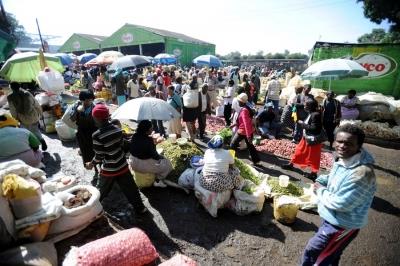
Kenya Reintroduces Broad Bean Farming To Boost Food Security
Benson Muturi, a fodder crops researcher and livestock nutritionist at Kenya Agricultural and Livestock Research Organisation (KALRO), said the government has partnered with private researchers to sell the seedlings to farmers for propagation.
The composite seeds are sold at KALRO centers, according to Muturi, adding that researchers have been disseminating information on broad bean growing to farmers while offering guidance on its proper husbandry for maximum yield.
"We sensitize farmers on the bean's benefits during Agricultural Society of Kenya shows alongside farmers' field days and through visits to farmers during their Self Help Groups and cooperative society meetings all over Kenya," Muturi told Xinhua news agency in an interview.
Social media platforms are among other platforms being used to reach out to growers, especially the young farmers, Muturi said.
The exotic leguminous plant, whose botanical name is Vicia faba, had been introduced by European settlers before the 1960s but was later abandoned by Kenyan farmers despite its high nutritional value.
According to Muturi, the broad beans have undergone field trials and have been confirmed to do well across different altitudes in the country, with researchers saying they have performed well in almost all regions in the country.
The leguminous plant, a good source of fiber and plant proteins, is planted with one seed per hole and gets to the flowering stage in three months, the best stage for fodder harvesting.
It can give a herbage yield of six metric tons per hectare. The protein-rich herbage is mixed with energy crops like maize silage and Napier grass and fed to dairy cows or dairy goats to boost milk production.
While the herbage has a crude protein of between 24 percent to 26 percent, the seeds' is even higher, standing at 32 percent to 36 percent, making it ideal for making animal feeds.
Due to its richness in protein, calcium, phosphorus, magnesium and zinc, the plant also improves milk quality and enhances animals' fertility and heart signs as well as conception, according to the nutritionist.
Magnesium and zinc boost immunity and memory in humans.
Broad beans regenerate after harvesting and so can be harvested for fodder severally per year.
The plant is for dual purpose and can also be consumed by human beings, Muturi said, noting that pods can be harvested while green in early stages and eaten raw as salads.
While dry, the beans can be milled and mixed with wheat flour at a ratio of 1:3 to make wheat products like cakes and buns. It can also be mixed in the same ration with maize flour to increase protein levels in the food.
On environmental matters, the broad bean plant is essential in nitrogen-fixing in the soil, just like other leguminous plants.
The plant, however, has its downsides as it is prone to attacks by aphids, which can easily be controlled by insecticide spraying.

Legal Disclaimer:
MENAFN provides the
information “as is” without warranty of any kind. We do not accept
any responsibility or liability for the accuracy, content, images,
videos, licenses, completeness, legality, or reliability of the information
contained in this article. If you have any complaints or copyright
issues related to this article, kindly contact the provider above.

















Comments
No comment